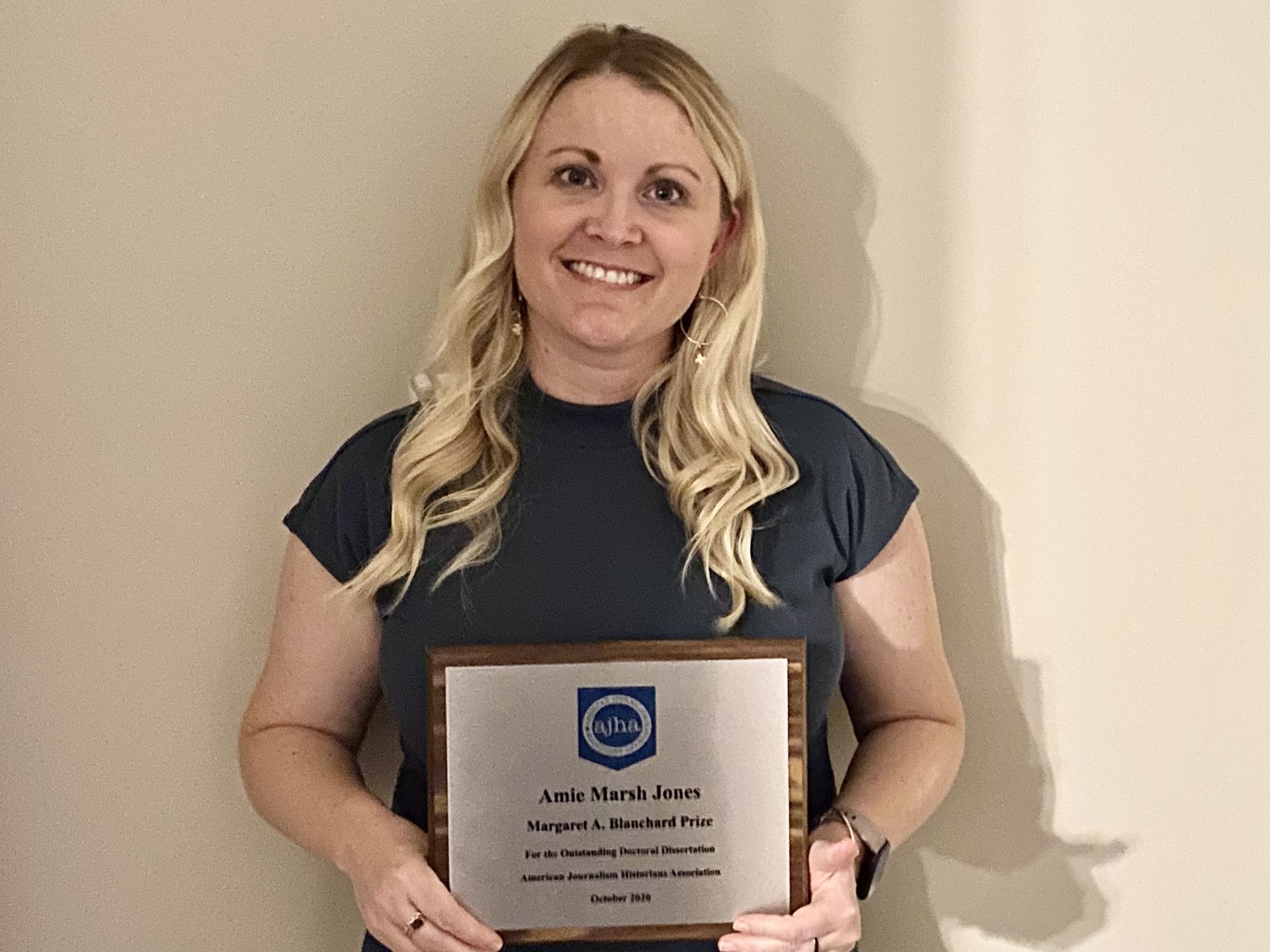
Amie Marsh Jones is the recipient of the 2020 Margaret A. Blanchard Prize, awarded to the outstanding doctoral dissertation on a mass communication history topic completed in the 2019 calendar year. She completed her dissertation “The Forgotten Children of Bath: Media and Memory of the Bath School Bombing of 1927” at the University of Georgia under the direction of Janice Hume.
Jones is the the assistant director of student services at the University of Georgia Graduate School. In this Q&A, she discusses her research process, advice for doctoral students, and future plans for her work.
For information on the Blanchard Prize and details on how to submit for the 2021 award, visit the Blanchard Prize page. - Erika Pribanic-Smith
How did you get into historical study? Was it an interest going into your graduate program, or did you discover it while pursuing your degree?
I discovered it while pursuing my degree. One of the courses that we could select for research methodology was “Historical Research in Mass Communication,” taught by Dr. Janice Hume. I found that I enjoyed this methodology much more than the traditional qualitative methods. That semester, my paper was on the topic of how female reporter Amy Robsart of the Boston Post covered the Lizzie Borden murder trial of 1893. It was fascinating. I was hooked on historical method after that.
Was there a particular research focus throughout your graduate study, or did you dabble in different things?
I dabbled some in a variety of topics at first, but I have always been interested in media coverage of crime so that became my focus in the latter years of my studies.
How did you decide on the topic for your dissertation?
In 2012, when the tragic murders of 20 children and six adults occurred at Sandy Hook Elementary School, I was looking into how media were covering the event. Many outlets were making comparisons to the tragedy at Columbine in 1999 or to the shootings at Virginia Tech in 2007. Phrases such as “worst in a school since Columbine” were commonplace. I started thinking, “Just what is the worst attack in a school in American history?” A simple Google search revealed the fact that Andrew Kehoe’s attack on Bath Consolidated School back in 1927 in the small village of Bath, Michigan, remains the deadliest. I was shocked. I had never heard of this. The media do not mention this. Why don’t we remember this tragedy? Surely the newspapers in 1927 covered this event. How did they do so? How might that coverage differ from coverage we see today of these tragedies? And, what role, if any, do media play in our seeming collective amnesia of the Bath tragedy? This is how the idea was born.
Describe your process for researching and writing your dissertation. In particular, how did you access the primary sources that you needed?
In discovering how media covered this event, I started out searching keywords in various historical newspaper databases, and this did provide me with an initial small start into my sample. However, I quickly realized that many of the newspapers that I needed had not yet been digitized. I then entered the world of microfilm. Luckily, my university library has some very nice microfilm machines, and I spent many afternoons scanning and saving from them in the library basement. I divided my sources into nearby newspapers, regional newspapers, and national ones. Some of the microfilm required that I travel to Michigan in order to view it, so I arranged this research to occur during my two visits there. Much of the microfilm could be lent to me via interlibrary loan so I was grateful for that. After I gathered all of the articles, around 250 in total, I began to look for themes in coverage and to digest what it all might mean. For memory of the disaster, I visited memory sites in Bath, studied artifacts and court documents, got to know residents, and attended the local 90th anniversary commemoration event of the disaster in May of 2017. Through all of this, I had the guidance of my major professor, a master of memory and media history, Dr. Janice Hume. Her mentorship was invaluable, of course, throughout my entire research and writing process.
What advice do you have for graduate students who are considering an historical dissertation topic?
My advice is to not limit yourself. What is wonderful about history is that there is so much from which to choose. And, there is always a nugget of history out there, or an aspect of it, that has yet to be brought to light. You could be the one to bring it up and help enlighten others. And, the process of unearthing it, while tedious at certain points, is ultimately very rewarding. It is a journey, a specific one that you are the first to experience, and that makes it exceptional.
Do you have any future plans for your dissertation research? (Book, article, public history, etc.)
I would like to publish it with an academic press. I am in the process of editing it, as to make the successful transition from dissertation to book. If for some reason that does not come to fruition, I will certainly make it available to the Bath School Museum, the Michigan State University library, and to the various local historical societies and county libraries around Bath. In this way, it will add to collective memory of the Bath tragedy of 1927 and be a resource for future researchers.

